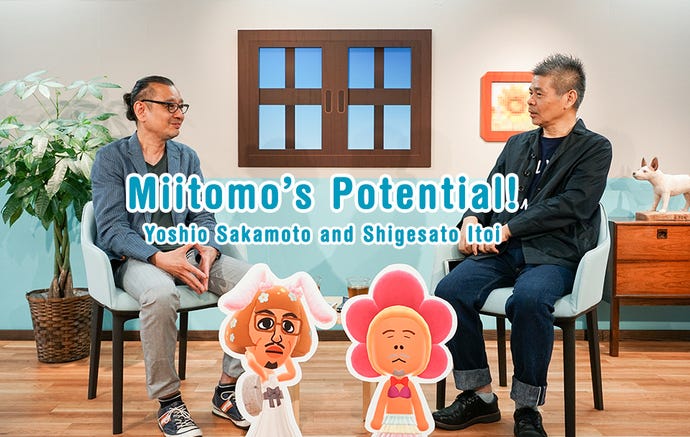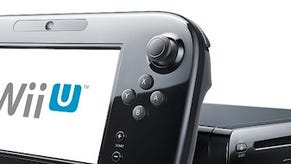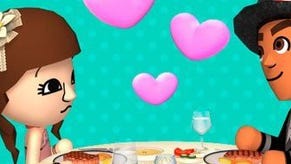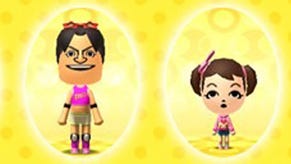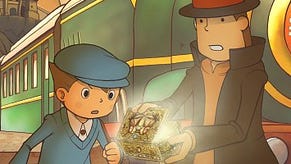The legacy of Iwata Asks lives on in this cinnamon roll Miitomo promo
Nintendo, stop making me love you.
So, Miitomo, yeah? It's a social network of sorts, and Nintendo's first smartphone app. People seem to like it. It's a promising start for Nintendo's new connected, hardware-agnostic future.
Now that everyone's caught up, let's talk about this wonderful promotional piece on the Miitomo website. For reasons that aren't entirely clear to me as a Nintendo-adjacent gamer, it's an informal interview chat between Earthbound creator Shigesato Itoi and Nintendo producer Yoshio Sakamoto.
If you were not already aware of the fact, these two men are treasures. Itoi's Mother series (that's Earthbound) have been hugely impactful and influential, but his whole career, mostly outside games, has been a string of creative and delightful events. His latest offering is a smartphone app described as "Instagram for pets", which also functions as a Japan-wide lost animal search network and educational hub for all things animal-related. Sakamoto, meanwhile, worked on games like Metroid, Rhythm Heaven and Wario Ware, Inc. Mega Microgame$ - but his perfection will become more apparent as we read on.
The interview proceeded in the cheerful, frank manner that made Iwata Asks such a wonderful resource: the two creatives talk freely about their experiences, swapping anecdotes, memories and insight, rather than sticking to PR bullet points. Itoi greets Sakamoto as a new acquaintance, and Sakamoto reminds them they actually have a shared history. Including some time spent at the wrap part for Mother 2 (again, that's Earthbound). This led to an extremely typical anecdote about the late, great Satoru Iwata:
"When we were making Mother 2, Mr. Iwata did something that he never did and asked if he could make a selfish request," Itoi revealed. "When we asked what it was, he asked that after Mother 2 was done we invite our wives to the wrap party.
"My wife is kind of a homebody, so she doesn't really go to places like that, but it was Mr. Iwata's first selfish request, so I asked that she please come."
That Iwata, so selfish: please bring your families to this event on the company dime. Of course that would be the only demand he makes of anybody.
As a result of this discussion, Sakamoto said he remembers Itoi's wife, who complimented his hairstyle "At the time I was kind of full of myself and I had a dreadlocks-style hair do," Sakamoto revealed.
Whoever formatted the interview for publication then included this image of Sakamoto's current hairstyle.
Not exactly your typical salary man cut; age hasn't mellowed the 57 year old.
Anyway, as if all this weren't delightful enough, the two then talk about the origins of Miitomo. Turns out Sakamoto thought there might be something more to be done with the social aspects of Hamtaro: The Great Friendship Plan. This led to a project which was eventually cancelled, but in the process the team created the Mii editor. Even in its early stages had an uncanny knack for suggesting alarmingly accurate caricatures - although it didn't seem to be anything that could become a game.
"I wasn't sure what to do, so I showed it to Mr. Iwata. 'Mr. Iwata, isn't this interesting' is what I said," Sakamoto said. "If I think about it now, I was acting like an excited little kid.
"Then he said something like 'hmm.....', like that. And then he said 'This seems like something Mr. Miyamoto would be excited about.'"
(By the way, throughout the interview Itoi performed impressions of various Nintendo executives; Sakamoto's reactions suggest they're pretty good. He did one of Iwata here.)
The Mii editor went on to be used for the Wii and subsequent consoles, and Sakamoto was drafted for the Mii Channel team. His cancelled project did not resurface, but some of the ideas turned up in Tomodachi Collection - the project he completed before moving on to Miitomo.
These sorts of project, evolving from prototypes and wild ideas, are only possible due to Iwata's influence, Itoi revealed. Most companies would insist on every project running past (probable) genius Shigeru Miyamoto, he said, but that would mean Miyamoto wouldn't have time for anything else, and all Nintendo's games would "end up being serious, full-length games" due to having to focus on one thing at a time.
"So maybe that is why Mr. Iwata made this team that was making stuff without Mr. Miyamoto's knowledge," Itoi said, to Sakamoto's agreement. "So, the result was that two centers of thought developed at Nintendo. The one under Mr. Miyamoto, and one outside of Mr. Miyamoto's circle.
"Mr. Iwata liked Mr. Miyamoto more than anyone and deeply respected him, but he thought that if everything was left to Mr. Miyamoto then Nintendo would go down only one path, so he ventured to make a team that was not under the supervision of Mr. Miyamoto. And Mr. Iwata managed the team himself, and he had us make games that could be developed in half a year. And that had a direct impact on Nintendo’s ability to regularly release games."
Sakamoto, who has never worked directly with Miyamoto, emphasised that there's no conflict between the two main development groups - but that they have very different cultures, and they carry out their work in "secret", outside of Miyamoto's influence.
If there was ever one thing missing from Iwata Asks, it was credit given to Iwata himself; a naturally modest man, he was unlikely to discuss how his own actions and decisions had shaped the company. It's wonderful to see Nintendo continuing the legacy of Iwata Asks, giving us a peek behind the curtain, putting a human face on game development - and honouring Iwata.
The interview has been broken into six parts, only two of which have been published so far; you might want to bookmark it and come back for more.
